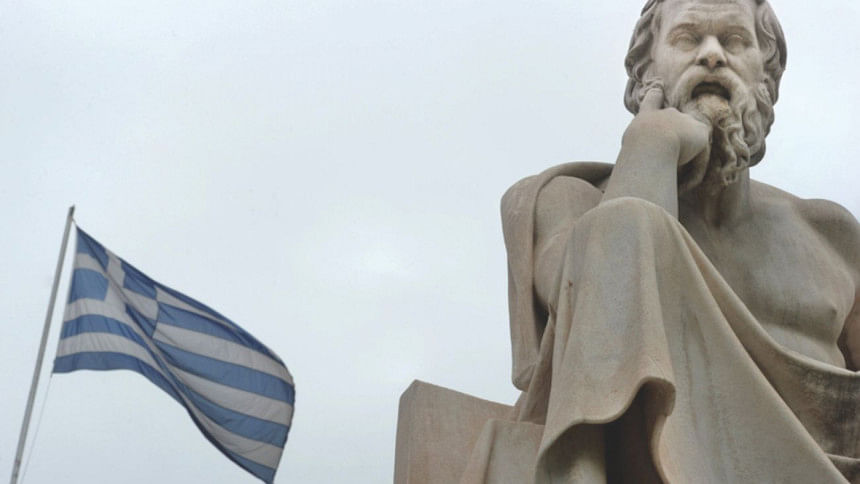THE GREEK ODYSSEY

The placid Aegean Sea, the whitewashed villas dotting its Islands and "Zorba's Dance" could delude some into believing that all is well with Greece. However, the harsh reality is diametrically different: for five long years Greece has been on the brink of bankruptcy, with indescribable hardships for its economically disempowered citizens. The Greek standoff with the European Union (EU) reached a crescendo on July 5, when its government, a coalition of the radical left, called for a referendum on the bailout package offered by the Troika (comprising the European Central Bank, the European Commission and the International Monetary Fund). Surprisingly, Greece voted "No" to the austerity measures recommended by the Troika. The "No" vote does not mark Greece's exit from the EU. It simply means that its people have expressed their collective wish to control their country's future trajectory, rather than yield to the diktat of outside players.
As a conscious citizen of the world, I am elated that the Greeks have united as a proud nation and decided that they want to take full control of their future – bleak as it may be. We have witnessed once more how mature democracies operate in the face of temporary reversals and disagreements. The day following the referendum, the German and French leaders publicly acknowledged their high respect for the "Greek people's verdict", and invited Greece to put its counter proposals on the table. There were no victory laps for Greek Prime Minister Tsipras just as there was no reactive retribution from the Troika. The erstwhile adversaries are already engaged in the business of finding concrete ways to make Greece a viable EU partner. Our leaders, please note that in democracies the point of no return is rarely crossed!
As the Greek drama of financial collapse, unemployment and bankruptcy unfolds, economists and politicians are busy debating the causes and effects of the country's failure to meet its debt terms. At the epicenter of this discussion is the accusation that Greece has lived beyond its means and must pay its debts since there are no "free lunches" in life.
There is plenty of truth in this accusation. But I would like to offer a slightly different perspective: Can we simply dismiss Greece as a financially bankrupt nation unable to pay its debt, without recalling how much we owe its ancient minds? It is the country that gave us democracy, the Olympics, philosophy, medicine, mathematics and fascinating mythological stories. Even the word Europe is derived from a maiden in Greek myth, Europa!
It is in Greece that the debate over public versus private goods first took place between Plato and Aristotle more than two thousand years ago. Plato advocated "the institution of communal arrangements for the begetting and rearing of children." His pupil Aristotle dismissed this idea as impractical arguing: "that which is common to the greatest number has the least care bestowed upon it." Ironically, the debate is alive even today as Greece is criticised for its unsustainable social welfare programmes.
As a gentle reminder to the readers it might be useful to recount Greece's numerous gifts to science and mathematics. What would our world be if Archimedes had not discovered the principle of buoyancy, if Pythagoras had not worked with geometrical angles and Hippocrates had not revolutionised ancient medicine? Yes, there is much that the world owes Greece – much that is not quantifiable in terms of Euros and Pounds!
I realise that in real life tangibles and intangibles need to be separated before balancing equations. Also, one cannot exonerate Greece from its decades old bad policies, hollow leadership, corruption and cronyism, and welfare culture. The European taxpayers have enough reasons to feel short-changed that they are paying for Greece's dysfunctional state. However, let us not throw the baby with the bath water. Perhaps, somewhere in the equation of decision-making, the Troika will give some weight to the fact that, as a rich, ancient civilisation, Greece deserves special consideration.
It's probably true that once the victory celebrations simmer down, Greece will be faced with hard reality. It might find more pensioners waiting outside banks, more youths lining up for jobs, more mothers of hungry children queuing up for subsidised food. But it's a domestic battle that Greece has opted to fight on its own terms. Whether it will succeed in alleviating its economic and social tensions, only time will tell. Perhaps this is another lesson in democracy that the Greeks are giving the world – a sovereign nation must run its own course and take full control of its fate, however risky it may be.
If the country can once again live up to its ancient traditions, it might be well poised to tackle its problems. Let us not underestimate the Greek spirit that Tennyson (Ulysses) described as "strong in will to strive, to seek, to find and not to yield".
The writer is a renowned Rabindra Sangeet exponent and a former employee of the World Bank.

 For all latest news, follow The Daily Star's Google News channel.
For all latest news, follow The Daily Star's Google News channel. 



Comments